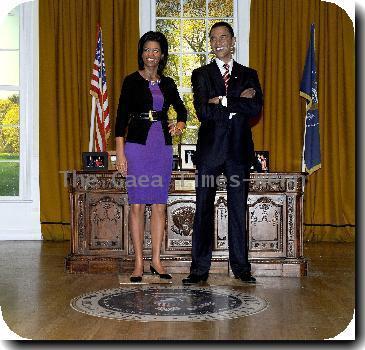Clinton, in London, lines up support to pass and enforce new Iran penalties
By Matthew Lee, APThursday, January 28, 2010
Clinton: Iran leaves penalties as only choice
LONDON — Iran leaves the world no recourse but to apply penalties aimed at curbing a fast-track nuclear program, U.S. Secretary of State Hillary Rodham Clinton said Thursday.
In London ostensibly for conferences on Afghanistan and Yemen, Clinton has devoted significant time to Iran ahead of a U.S.-led sanctions push at the United Nations expected by the end of the week.
Her discussions here are intended to win support from countries whose backing the United States and its allies need to win and enforce new U.N. sanctions.
“Our efforts to apply pressure on Iran are not meant to punish the Iranian people. They are meant to change the approach the Iranian government has taken toward its nuclear program,” Clinton said.
The Obama administration has said Iran appears bent on developing nuclear weapons, although Iran claims its nuclear work is peaceful. Iran is thought to have stockpiled more than enough nuclear material to manufacture a single bomb, and more is being made daily.
Administration officials have invited new talks with Iran, but with no sign that Iran wants to do business, the focus has turned to penalties.
“As Iran’s leaders continue to ignore their obligations, there should be no doubt,” President Barack Obama said in Wednesday’s State of the Union address. “They, too, will face growing consequences. That is a promise.”
Iran last week rejected a Western-backed compromise to export most of the fuel for processing into fuel that could run a peaceful medical reactor but could not power a bomb.
China is expected to be the biggest obstacle to winning a fourth round of U.N. penalties, and Clinton brought her sanctions specialists with her to see Chinese Foreign Minister Yang Jiechi in London.
She called the session with Chinese officials productive but would not elaborate.
Speaking later, a senior U.S. official said the Chinese made no promises but did not rule out new sanctions, as Chinese officials have done in the past.
Chinese officials worry that pushing for sanctions now would jeopardize negotiations they believe are still alive, the official said, but they didn’t refuse to seek sanctions. The official, speaking on condition of anonymity to describe the private exchange, expressed confidence the U.S. would win a new sanctions resolution.
Clinton also met Thursday on Iran with senior officials from key Arab and European nations. Accompanied by State Department and Treasury Department leaders on the issue, Clinton discussed Iran with the foreign ministers of Saudi Arabia, the United Arab Emirates, Britain, France, Germany and Italy.
Iran was part of her talks a day earlier with Russian Foreign Minister Sergey Lavrov, also a traditional skeptic about the value of economic penalties against oil-rich Iran.
U.S. officials are preparing to circulate an outline of tough new Iran sanctions at the U.N. The proposed measures would target elements of the Iranian Revolutionary Guards Corps with new measures and would target the financial and energy sectors under existing sanctions resolutions, said the officials, who spoke on condition of anonymity because discussions were ongoing.
Such sanctions were part of a measure approved Thursday night by the U.S. Senate and a bill already passed by the U.S. House. Once the bills are reconciled, the resulting measure would likely be approved by Congress and sent to U.S. President Barack Obama for his signature.
“We have all watched the Iranian regime oppress its own people on the streets of Iran and continue to defy the international community on nuclear issues,” Senate Majority Leader Harry Reid said in a statement following a voice vote approving the bill. “That is why it is so important that we move this legislation forward quickly.”
The Security Council has imposed three rounds of sanctions on Iran over suspicions it is hiding nuclear activities and fears that it could retool its enrichment program from making low-grade material to produce nuclear power into producing weapons-grade uranium for nuclear warheads.
The United States is trying to maintain six-power unity on how to deal with Iran. On Wednesday, Clinton said she thinks Russia, China and others are coming around to the view that it is time for the Iranian government to face consequences for failing to prove its nuclear program is peaceful.
Tags: Asia, Barack Obama, China, East Asia, Eastern Europe, England, Europe, Foreign Policy, Greater China, Iran, London, Middle East, North America, Nuclear Weapons, Russia, Saudi Arabia, State of the union, Union, United Kingdom, United States, Weapons Of Mass Destruction, Western Europe





